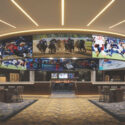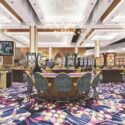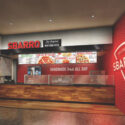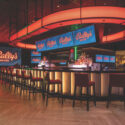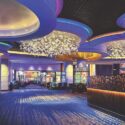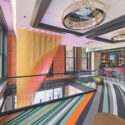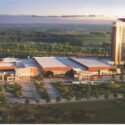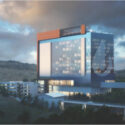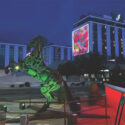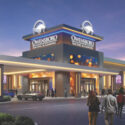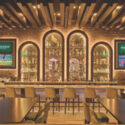More and more, casinos heed age-old principles of feng shui
Feng shui. Taken from the original Cantonese, the words literally mean “wind” and “water”; together they refer to the traditional Chinese art of arranging environments to foster maximum prosperity and health.
The principles are thousands of years old, but feng shui did not become well known in the West until the mid-1980s, when its emphasis on harmonious living, the occasional use of crystals and incantations, and references to yin and yang (male and female energies also known as “chi”) attracted the New Age crowd.
Though it is sometimes dismissed in the mainstream as superstition, pseudoscience or pseudo-mysticism, and has even been debunked (along with Ouija boards and alien abductions) by magician-skeptics Penn and Teller, feng shui as a design tool may be the victim of a mass cultural misunderstanding.
“As soon as we attach an Asian influence, all of it sounds foreign,” says design consultant Terry Dougall, founder of Dougall Design Associates of Pasadena. “But you can find a mirror image of feng shui practice (in Western design). And if you change the word ‘energy’ to ‘comfort,’ all of a sudden everything falls into place.”
A Feng Shui Primer
With a career that spans more than three decades and a client list that includes Boyd Gaming, Mirage Resorts, Mandalay Bay and the Venetian, Dougall has witnessed the increasing application of feng shui in architectural and interior design, particularly at casinos.
“Since the 1990s,” he says, “everybody has understood the necessity of having a feng shui expert review the facilities they’re doing.”
At its core, feng shui is about proper placement for maximum utility, and it’s hard to argue with its basic tenets. Who would dispute the appropriateness of positioning a home for maximum sunlight? That’s feng shui. Who would scorn the advantages, psychological and practical, of living near a water source? That, too, is feng shui.
Though the channeling of luck and “chi” (or, in the Japanese, “qi”) may sound preposterous to practical Westerners, few would quarrel with the benefits of open, airy spaces without a “boxed-in” feeling. That’s Feng Shui 101, and it’s become the standard in new construction, from casinos to restaurants to retail to home living areas.
Feng shui, says Dougall, is also about etiquette. For example: “When you walk into any casino, someone should be facing you, ready to greet you. For the same reason, when you’re doing a high-limit table game area, you try to face them all to the front door so the dealers don’t have their backs to the patrons.
“When you think about it,” he says, “it’s a sweet thing. Why wouldn’t I want to be nice and polite and make my guests comfortable? We spend 80 percent of the time talking about the idiosyncrasies of feng shui-the focus on bad luck, and having running water run the right way-but it really comes down to courtesy and politeness.”
In that way, feng shui, like etiquette, is about as American as Emily Post.
In the Vanguard
Not surprisingly, the movement to consciously incorporate feng shui precepts in casino design grew as the Asian client base grew. Casino titan Steve Wynn was among the first to acknowledge the importance of the practice at his resorts. He recruited feng shui masters to vet the construction and design of the Mirage and Wynn Las Vegas. (Like most newer facilities in Las Vegas, the Wynn does not have floors 40 through 49 because the number four in Chinese sounds like the word for death.)
Donald Trump had a feng shui expert sign off on at least one of his properties. Back in 1995, Master Pin Yun blessed the non-casino Trump International Tower and Hotel in Manhattan after builders heeded several recommendations: that the main entrance face onto Central Park (the better to draw in good chi), that the color of the building be changed from gold to bronze (to better reflect passing clouds, also a sign of positive natural energy), and that a large hammered metal globe be placed in front of the tower (to deflect the negative chi from surrounding traffic).
It bears noting that the building’s first prospective tenants included overseas investors from Hong Kong, Taiwan and China. If feng shui was nothing more than a marketing ploy, it served its purpose for Trump, who said at the time, “It’s important to adhere to the principles of a large group of people who truly believe in these principles…. If they believe them, that’s good enough for me.”
Trump has remained mum about the use of feng shui at his Atlantic City casinos, but the Asian gaming pit at Trump Plaza reads like a feng shui textbook, with plenty of mirrors to reflect and boost the fortune of the players, opulent stone-and-wood-inlaid columns to introduce the energy of nature, and a wall of gaming tables that look out onto the floor, so no dealer will ever have his or her back to a guest.
Westar Architects, which created the space, used lots of the color red, which “gives energy and enthusiasm,” says architect Paul Heretakis.
For the Chinese, red is also symbolic of love and happiness, while blue and black denote money and protection.
Growing Influence
Perhaps the most notable feng shui faux pas-and a sterling example of the magnitude of these principles-was the original entrance to the MGM Grand on the Las Vegas Strip, where guests entered the casino through the roaring “mouth” of the famous MGM lion.
Because Chinese patrons consider it unlucky to walk through the mouth of an animal (even the representation of an animal), they came in through a different entrance or shunned the casino altogether. As soon as their reluctance was noted, the entryway was torn down and reconfigured, with Leo the Lion recast as an enormous bronze statue, standing guard at the doorway.
Another feng shui snafu: Luxor, the massive Egyptian pyramid in Las Vegas, built by Mandalay Bay. In some traditions, the pyramid is a fortunate silhouette, but at the Luxor, with its sphinx-and-mummy motif, Asian patrons saw nothing but a giant tomb.
In 2007, new owner MGM Mirage announced a $300 million renovation that did away with much of the resort’s heavy Egyptian theming, including Club Ra. Though the renovation was more of a de-theming than a feng shui repair job, it’s doubtful that a casino operator today would ignore the importance of feng shui to at least part of its customer base.
“Clearly, these are important customers,” Dougall says. “It’s important to honor their beliefs and culture.”
The attention to Asian players and the drive to accommodate their needs grows apace. In Atlantic City, Harrah’s has invested considerable revenue and countless man-hours in the proper presentation of the Asian gaming spaces and dining areas at its four properties: Harrah’s, Caesars, Bally’s and Showboat. In fact, Dan Nita, senior vice president and general manager of Harrah’s Atlantic City, has become quite fluent in the tenets and terminology of the ancient Chinese art.
In creating an Asian casino space, says Nita, “We spent a significant amount of time with our designers, who have done tremendous research with various Asian philosophies-feng shui, I Ching, yin and yang, Pakua-it has absolutely influenced the design of our Asian table games and also our noodle bars.”
The Kwi Restaurant and Noodle Bar at Caesars, for example, features a stained glass column with a color pattern resembling fire, royal blue tiles that represent water, and earth-toned terrazzo flooring. A Korean-inspired mural includes 150,000 chopsticks (representing wood) painted to look like the sun, the moon and flowing water.
The entire bar has a “yin and yang-inspired shape,” says Nita. Overarching the entire space is a painted boat with a golden sail on the ceiling to
suggest good fortune (“sailing before the wind”).
Seating in the Asian table games area is embedded with symbols, “a version of Morse code” that enables patrons to chart the most fortunate location in the room by the date and place of their birth, Nita says.
The importance of Asian players is also reflected in the outreach of global operators and others to Asian countries. Nevada has opened a tourism office in Beijing, and the University of Nevada Las Vegas has opened a satellite campus in Singapore. Over the last decade, MGM Mirage, the Las Vegas Sands and Wynn Resorts have all spent billions on hotel-casinos in the Chinese territory of Macau.
Vanishing Act
Ironically, feng shui may be least employed where it would seem most at home.
“In Macau itself, which surprised me, only the Sands Casino, the Pinnacle, just two or three of the major casinos utilize it,” says interior designer Floss Barber of Philadelphia, whose clients include the Hilton, Harrah’s and Revel Atlantic City.
Barber says the dearth of feng shui in its homeland resulted from “a cleansing of the folk arts and cultural arts” when the People’s Republic of China was established in the mid-20th century. The practice was officially deemed “feudalistic superstition” and a “social evil” according to communist ideology.
“We are in China 10 years, and we know more about it than the locals-actually, it shocked me,” Barber says. “People in their 40s or younger know only that their grandmother or parents knew it and practiced it.”
Taiwanese feng shui master Meihwha Lin is not surprised at the seeming disappearance of feng shui in China. “The communists oppose it,” she says, “because it is really very empowering.”
Barber says a feng shui expert might have come in handy at the Venetian Macao when the main gaming floor was laid out, because in her opinion, the creators of the $2.4 billion resort got it all wrong.
“The head of the Venetian came from a meeting- space background, favoring spaces that are very northeast-southwest- oriented, very straightforward, no meandering,” Barber says. That mindset created trouble when the doors opened and patrons flooded on to a gaming floor where the “chi,” or energy, apparently led them straight through and out again, without spending a lot of money to play.
“The space was so large that people were daunted by the length of it,” says Barber. “Nothing pulled them in. They saw too much, too soon, too fast. You have to create some meandering to keep them there.”
“If there is any kind of a straight pathway, people will come and go fast,” agrees Meihwha Lin, who has consulted with Barber on projects including the upcoming SugarHouse Casino on the Philadelphia riverfront. “A serpentine path, like a curving road, is a much more friendly way of making people feel relaxed and comfortable.”
Nooks and niches invite patrons to explore; when they feel comfortable lingering, they tend to play. It is subtle aesthetics that can have real influence on the profitability of a property, claims Meihwa Lin, and it has little to do with mysticism.
“There are two components. One is the visible: the form, the design, the lighting, the décor. But there is also an invisible component, the universal energy that we cannot see but we can all feel. If you think of animals, fish, birds, they respond very well to the energy of the earth. It is the earth’s magnetic energy that leads the birds to migrate thousands of miles; they can feel the magnetic energy and read the stars.
“Aren’t we like that too? We can all feel a place where the energy is good-beyond the form, beyond the aesthetics.”
The Basics
A request for feng shui information on Google results in at least 23 million responses for the definition alone, and that’s just the beginning. With its different “schools,” different techniques and a history that predates Christ by at least 1,500 years, a student of feng shui would need years of rigorous study to fully understand the nuances of the practice, which is not one practice but many, not one culture (Asian) but many (Chinese, Japanese, Korean, Vietnamese, Indian). Eight Mansions feng shui is not the same as Black Sect, which differs from Flying Star and Shen Dao.
So how do casino designers apply the appropriate principles to please their guests, and hopefully harness the good energies of wealth and prosperity? There are some immutable basics, like the value of natural elements (wood, fire, earth, metal, water).
“We try to have each of the five basic materials in every project, a modern use of very expensive and very beautiful materials-onyx, stones, woods,” says Heretakis. “Water can be used literally, in a water feature, or in an abstract manner (images of water, for example). We travel to Chinatowns throughout the country to buy artwork that implies good fortune, good luck and long life.”
In addition to knowing the color wheel, it is also important for casino operators to understand the cultural connotations of certain shapes, and how they affect the fortunes of players. When Floss Barber wanted to “enhance the fire energy” of a casino space, she used a red carpet with a triangular or flame motif. The fiery glass chandeliers by sculptor Dale Chihouly at Atlantic City’s Borgata add energy as well as deluxe dazzle to that property.
But that same symbolism in another context might be perceived as destructive, Barber adds. “We are working on a casino now where the designer had two curves coming together to create a sharp point at the garage entrance of the casino. That’s the last thing you want; that’s a poison arrow.” Poison arrows, as the name suggests, create disharmony for those who utilize the space.
Though she knows some see feng shui as nothing more than “hocus pocus,” Barber insists that the principles used poorly can actually do harm.
“This is not something you dabble in,” she warns.
A Good Foundation
Luckily, faulty feng shui does not typically require a major structural overhaul. Destructive fire energy, for example, can be quenched or neutralized by the introduction of water, or water symbols. And though Meihwa Lin claims that the energy of the universe shifts on February 4 of each year, that doesn’t mean businesses must realign their environments on an annual basis.
“You can fine-tune an area to activate more prosperity, and areas with negative energy can be controlled and adjusted,” she says. “But whenever you build a space at the casino, the energy blueprint will last until a major renovation takes place.”
And that, for casino operators, is very good chi.



